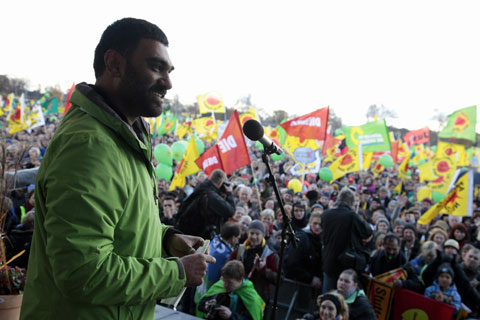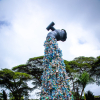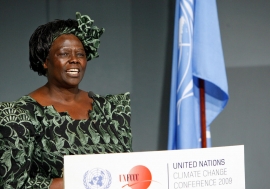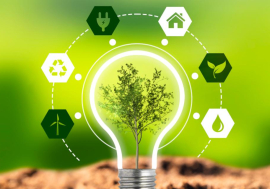‘We need a sustainable path for our future’
‘We need a sustainable path for our future’
 Kumi Naidoo, fighting for the environment, development and people’s empowerment.
Kumi Naidoo, fighting for the environment, development and people’s empowerment.Your early activism in South Africa focused on combating poverty. Are there links between that work and what you now do at Greenpeace?
When I was young, growing up in Durban, South Africa, there was a negative attitude towards the environmental movement. It was perceived as a “white people” movement, for rich people who cared more about the animals and trees than they did about black people. That, of course, is not what the environmental movement is about.
I used to work combating poverty. Now I am working on environmental issues. An activist is an activist, and I am an activist first and foremost.
I remember the day Greenpeace became an option for me. I was in the midst of a hunger strike to protest against the South Africa government’s position on the Zimbabwean regime of Robert Mugabe. My daughter called me and said, “Dad, you have to take this job. If you do not take this job, it means that you choose not to fight for my future and the future of all the world’s children.” She went on to say that Greenpeace is an effective vehicle to peacefully fight for a better future.
That is basically how I see it. Economic growth is not sustainable without social and environmental justice. We, especially in Africa, need to learn from the mistakes of the past in the developed world. The development paradigms of the time can no longer work for Africa. We need to adopt a sustainable path for our future, and the future of our planet and our continent.
Twenty years ago, the first Rio summit emphasized that environmental protection and economic development are complementary, rather than counter-posed priorities. How significant was that shift in perspective?
Rio 1992 ended the false dichotomy between environment and development. Governments pledged to make development work for all, including for future generations. This was a breakthrough and remains our real global challenge: to deliver decent lives for all within the ecological boundaries the planet sets for us.
Key environmental agreements, such as the Kyoto Protocol and the Protocol on Access and Benefit Sharing have been agreed since Rio. Last year investments in renewable energies overtook investments in old fossil fuel technologies for the first time.
At Rio [2012] governments must listen to the people, not the polluters, otherwise they are bound to fail the world. It’s a very small but powerful group of players who gain from the current destructive status quo that is holding us back. The finance industry has succeeded in making the taxpayer pay for its bad decisions and is stopping governments from effectively regulating global financial markets.
To be credible, Rio+20 must support an energy revolution based on renewable energy and energy efficiency and providing access to energy for all. Governments and businesses must commit to zero deforestation by 2020.
One key test for Rio is that governments finally launch negotiations to protect the high seas, which currently are being plundered Wild West style. Greenpeace calls for a new implementing agreement under the UN Convention on the Law of the Sea that ensures the conservation of marine biodiversity and sustainable management of human activities on the high seas.
Rio+20 will seek to popularize the notion of the “green economy.” What might that mean for Africa?
A fair green economy is achievable, but it requires urgent action. Promoting sustainable practices is essential. But above all governments must put a decisive end to unsustainable practices. An economy based on nuclear energy, oil and coal, genetic engineering, toxic chemicals or the overexploitation of our forests and seas will never be green.
The fair green economy we want is one that provides sustainable livelihoods for all while fully respecting ecological limits — our planetary boundaries. In a truly green economy, the economy will be a mechanism to deliver societal goals, and economic growth as an end goal in and of itself will be abandoned.
The green economy is not only an opportunity for African countries, but a necessity. Africa is at the frontline of climate change. One can already see the impacts: drought, conflicts in areas such as the Horn of Africa, increased migrations, food security compromised…. We can no longer sit back and watch it happen.
Climate change can be an opportunity for Africa; it doesn’t have to remain a threat. There is huge potential for building new industries across Africa. We are blessed with vast renewable energy sources such as sun and wind. The wealth is simply amazing. The transformation we need is taking place too slowly. But the good news is that it is already proven. In Germany, 81 per cent of all installed power capacity in the last decade was renewable!
Greenpeace has developed an “energy revolution” scenario together with business partners. It shows that globally we can deliver energy to more people, especially the poor in developing countries, cut emissions by more than 80 per cent by 2050 — and create more jobs doing so, by investing in energy efficiency and renewable energy instead of fossil fuels and nuclear power. By implementing the energy revolution, governments can help businesses create 3.2 million more jobs by 2030 in the global power supply sector alone. In South Africa 149,000 direct jobs could be created by 2030 — 38,000 more than in the current government’s plan. That’s the kind of decisive action — leading to wins for the planet and the poor alike — that a green economy could deliver.
Many governments and businesses, however, are talking of a green economy, but really mean business as usual. Greenpeace will oppose any “green washing” of the green economy and demand that justice and environmental protection go hand in hand.
There is a general recognition that things have to change — business as usual cannot work. The past exploitation of natural resources only benefited foreign entities, while degrading African environments, livelihoods and social structures. Agricultural development towards ecological farming and investments in regional markets will be critical to ensure meeting one of the most threatening crises of today: climate change.
Some African countries are rich in minerals, oil and other extractable resources. The dynamics of the global economy encourage them to maximize the short-term exploitation of such resources. How can the governments of such countries be convinced to adopt a longer-term perspective?
First, the debts of these governments must be written off so that they are not forced to sell their precious resources simply to service the debt.
Second, the very international financial institutions that caused the problem need to invest in the solution. The World Bank, the African Development Bank and others could become leaders in financing an energy revolution based on energy efficiency and sustainable renewable energies. Their energy portfolios must be invested 100 per cent into sustainable renewables and efficiencies.
Third, we need the Rio summit this June to agree to bring the absolute consumption of renewable and non-renewable resources and the impacts of their extraction within planetary boundaries, in a fair and equitable manner.
Fourth, governments must realize that these resources are the basis for their long-term development and should therefore not be exported at any cost. More and more countries are realizing this, with China starting to restrict exports of some key resources.
Finally, world trade rules must be changed to give African governments the policy space they need to protect their resource base.
At international conferences on the environment, African delegates often raise the need for financial support to help them adapt and change. Do you see this happening?
Social and environmental protection needs additional money, and it is high time governments provide it. Developed countries have indeed broken many aid promises. That is shameful, especially when you consider how much money they could easily find when they decided they needed to bail out their greedy banks.
The Group of 20 countries need to implement a financial transaction tax and end the perversity that billions are spent each year on subsidizing fossil fuels. The G20 has committed to act on fossil fuel subsidies and they must do so now in order to generate new and additional money for the environment and development. This money could, for example, support poorer countries in the transition to renewable energies.
What can be done to help African countries combat excessive logging, the uncontrolled expansion of farmland and other practices that contribute to deforestation?
Logging in the Congo Basin countries is out of control. The international community must stop encouraging and financing the expansion of large industrial logging concessions into the remaining intact forests under the guise of so-called “sustainable management.” If logging was “sustainable,” companies wouldn’t need to keep expanding into the last corners of the Congo Basin; they could keep logging the vast areas they already control. The prevailing model of the industrial logging concession, which puts millions of hectares of forest into the hands of a few largely European — and increasingly Asian — companies, is based on corruption, fraud and exploitation of underpaid labor, a sad reminder of colonial times.
While logging for timber is the first door-opener to destruction, the biggest threats in the near future to the environment — and to food security! — are the large land grabs currently underway by agribusiness companies to expand oil palm and other plantations in Africa. These trends are very alarming, and will deprive even more poor people of the means to support themselves.
What is most needed in Africa — except for an end to corruption and human rights abuses — are tenure reforms and participatory land use planning policies that are based on the needs of rural communities and put the land back under local control. We know from other regions in the world that those who have rights and control over their own land are motivated to conserve it for future generations. Studies show that the world’s most effectively protected forests are not the strictly protected areas with a fence around them, but the forests that are managed by indigenous peoples themselves.
Developed country governments can act at home and overseas by no longer treating Africa primarily as a source of cheap commodities to feed Western growth and consumerism. They need regulations to stop companies from committing acts in Africa that they would go to jail for in their home country. And the international community needs to start backing programmes that directly support the poor and their rights, and help strengthen civil society in African countries.
Desertification and land degradation are particular concerns in Africa. Are they getting enough attention in international discussions of sustainable development?
No, they are not given sufficient weight. You can see that when you look at the pitiful budget and capacity of the UN Convention to Combat Desertification. Greenpeace calls for sustainable agriculture that works with the land rather than against it, which avoids degradation. Greenpeace works in the forests — including with indigenous peoples — to show that development is possible without deforestation and degradation. Also without proper governance — land use planning — and regulations and law enforcement, the problem of desertification cannot be addressed properly.
Can Africa become more than a bystander in the international discussions on climate change?
The tragedy about this whole issue for somebody like me — coming from Africa — is that the people who are least responsible for climate chaos are the ones who are paying the first and the most brutal price. Climate change in Africa is contributing to the creation of more deserts, starvation and water scarcity. The eastern Horn of Africa has experienced two consecutive failed rainy seasons. Whereas droughts were recorded every six to eight years in the past, they now occur every one to two years.
Our continent needs to take leadership in the international negotiations, nationally and regionally. Our political leaders need to understand and accept that other nations’ actions will impact their own people at home, and they need to be clear and not compromise our right to a future.
What will happen if negotiators fail to agree on a suitable successor to the Kyoto Protocol, which seeks to curb emissions of the “greenhouse gases” that harm the earth’s ozone layer?
The answer is simple: They then will be admitting that governments and political leaders are sleep walking us into a crisis of epic proportions, putting the future and lives of our children and grandchildren in jeopardy and great danger.
Many citizens in the world, especially young people — I know my own daughter feels this way — are completely disgusted by how governments lack the political will to establish a solid, time-bound process to address the biggest threat our planet faces.
The equation is very simple: Governments must agree to peak global emissions [of greenhouse gases] by 2015 and reduce emissions by at least 80 per cent below 1990 levels by 2050. This is not a Greenpeace statement. This is according to the recommendations of the Intergovernmental Panel on Climate Change.
How can global management of the environment be strengthened?
Kenya and the African Union have recently called for an upgrade of the United Nations Environment Program (UNEP) to full agency status. That would mean that UNEP no longer has to beg for voluntary contributions every year, but has secured funding from now on. Greenpeace supports this move and expects it as one concrete outcome of the Rio summit this year.
African governments should also remember that in Johannesburg in 2002 governments agreed to develop international rules for global corporations and spearhead a call for governments to commit to corporate accountability and liability. Today governance gaps created by globalization provide a permissive environment for wrongful acts by companies. At Rio 2012, governments must agree to the development of a global instrument that ensures full liability for any social or environmental damage that global corporations cause.
African governments should also call for creating strong regulation and control of financial markets and introducing restrictions on speculators and speculative products to stop harmful practices that lead to rising resource and commodity prices and an accelerated depletion of natural resources, with dramatic consequences for poor people and small economies.
Do African governments need to listen more to their own people?
A true revolution can only start when governments start listening to the people and not to the polluters. The power of the people can no longer be undermined. What our brothers and sisters in North Africa and the Middle East have done is a clear example of that. Based on what history has taught us, at the end of the day it is up to the voices of thoughtful, concerned citizens to stand up and resist the lack of action. If there is one thing I have learned about big systemic change, it is the following: Without decent men and women who say that enough is enough, and who are willing to go to prison for it, systemic change won’t happen.
Progressive protesters were always ridiculed for their opinions, but in the end the establishment realized the truth in their claims. Mahatma Gandhi, Martin Luther King and Nelson Mandela all struggled hard before gaining recognition. This is why I always say to activists: “You must realize that the struggle for justice, in our case environmental justice, is not a popularity contest.” Just because people might not agree with you now, it does not mean that we are wrong.
There is a strong civil society across Africa, and it’s getting stronger and stronger. The recent events not only in North Africa but also across the continent have shown the power of people. We need to go beyond the solo approach and work together and lend our voices across all sectors: environmental, human rights, health, education, etc. Only our collective voice will be heard.
—Africa Renewal online












